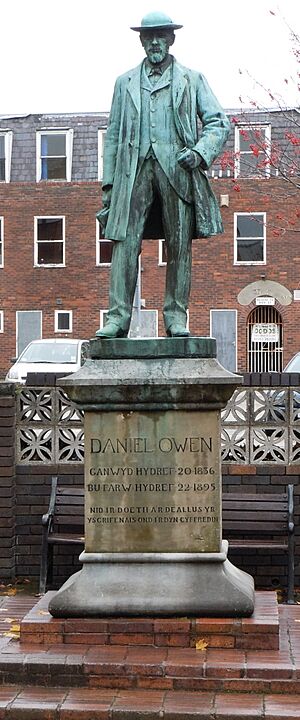Daniel Owen facts for kids
Daniel Owen (born October 20, 1836 – died October 22, 1895) was a famous Welsh writer who wrote novels. Many people think he was the most important Welsh-language novelist of the 1800s. He was also the first major writer to create novels in the Welsh language.
Contents
Who Was Daniel Owen?
Daniel Owen was born in a town called Mold in Flintshire, Wales. He was the youngest of six children in a working-class family. His father, Robert Owen, worked as a coal miner. His mother's family included a famous poet and writer named Thomas Edwards.
A sad event happened when Daniel was very young. On May 10, 1837, his father and two older brothers, James and Robert, died in a mining accident. The Argoed mine flooded, causing their deaths. This tragedy made life very hard for the family, and they remained poor. Daniel did not get much formal schooling, but he learned a lot from his Sunday School.
Daniel's Apprenticeship
When Daniel Owen was 12 years old, he started working as an apprentice for a tailor named Angel Jones. An apprentice is someone who learns a skill or trade from a master. Angel Jones was also an elder in the Calvinistic Methodist Church.
Owen later said that his time as an apprentice was like going to "a kind of college." He started writing poetry while working there, inspired by one of his co-workers. He also enjoyed talking and debating different topics with his colleagues and customers.
Daniel Owen's Early Writing Journey
Daniel Owen began his writing career by creating poetry. He used the pen name Glaslwyn. He often entered his poems into local eisteddfodau, which are Welsh festivals of literature, music, and performance. Some of his poems were even published.
His first important work in Welsh was a translation of a short novel. It was called Ten Nights in a Bar-Room and What I Saw There by Timothy Shay Arthur. Owen's Welsh version came out every two weeks and was titled Charles o'r Bala.
Becoming a Preacher and a Writer
Owen tried to become a minister for his church and started preaching in 1860. In 1865, he went to Bala Theological College. However, he did not finish the course. From 1867 until he passed away, he worked as a tailor in Mold. He continued to preach on Sundays until he became too ill to do so.
Later, a person who guided him, Roger Edwards, suggested that Owen try writing stories instead. Owen's first attempt at fiction was a short story called "Cymeriadau Methodistaidd" (Methodist Characters). It was about how elders were chosen in a chapel. This story was somewhat successful, which encouraged Edwards to tell Owen to write his first novel.
That first novel was Y Dreflan. It described a made-up version of Mold, the town where Owen lived.
Daniel Owen's Main Novels
While Y Dreflan was popular when it came out, Daniel Owen is mostly famous for three later novels. The most well-known are Rhys Lewis and its follow-up, Enoc Huws.
In these books, Owen again wrote about a fictional version of Mold and its Methodist chapel culture. He mixed funny parts with clever jokes and deep thoughts about people's feelings. People have compared his writing to that of Charles Dickens, a famous English writer. Dickens likely influenced Owen. However, Owen's work is special because it comes from his own Welsh-language culture and his background in the chapel.
Daniel Owen's Published Books
Here are some of the books Daniel Owen wrote:
- Deng Noswaith Yn y `Black Lion` (1859)
- Offrymau Neilltuaeth (1879)
- Y Dreflan (1881)
- Rhys Lewis (1885)
- Y Siswrn (1886)
- Enoc Huws (1891)
- Gwen Tomos (1894)
- Straeon y Pentan (short stories) (1895)
Daniel Owen's Lasting Impact
Even though Daniel Owen was not the very first person to write novels in Welsh, he is the earliest Welsh-language novelist whose books are still widely read today. He is known for starting a tradition of novel-writing in Welsh. This tradition then influenced later fiction writers like Kate Roberts and T. Rowland Hughes.
Mold, Owen's hometown, remembers him in several ways. There is a statue of him, and a shopping area and cultural center are named after him. He is also honored with the Daniel Owen Memorial Prize (Gwobr Goffa Daniel Owen). This prize has been given out at the National Eisteddfod since 1978. It is awarded for the best unpublished novel of at least 50,000 words that has a strong story, but only if the entries are good enough. Mold also holds an annual cultural festival that celebrates Owen's life and his works.
 | DeHart Hubbard |
 | Wilma Rudolph |
 | Jesse Owens |
 | Jackie Joyner-Kersee |
 | Major Taylor |


